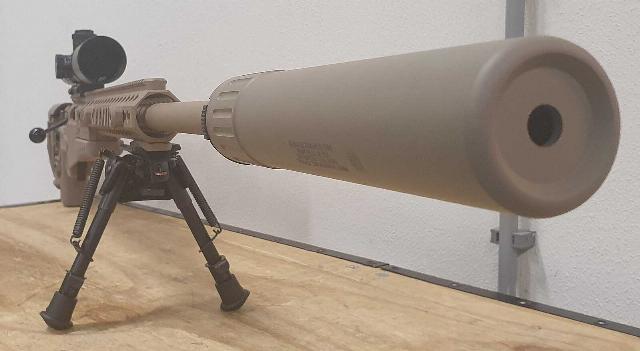Potentially positive suppressor developments
Both the House and Senate versions of the Big Beautiful Bill contain a provision de-listing suppressors. Should that provision remain in the final version of the BBB, Americans will be able to buy suppressors without paying a $200 tax and without a federal vetting process that can take up to a year. Suppressor prices should also decline. Should it not be in the final version, there will be only Republicans to blame.
There appears to also be positive movement toward greater liberty for Americans on the legal front. In February of this year, in U.S. v. Peterson, The Fifth Circuit Court of Appeals affirmed the conviction of a man for owning an unregistered suppressor. The three-judge panel wrote that suppressors aren’t weapons and thus aren’t protected by the Second Amendment.

Graphic: Accuracy International AXMC. Wikimedia Commons.org. CC CCO 1.0 U, Public Domain.
Peterson asked every judge on the court to hear his appeal, and a variety of gun-rights groups joined his case. Fortunately, the Trump DOJ, acting under President Trump’s order to protect the Second Amendment rights of Americans, asked for a 30-day delay to allow the Government to “further consider its position.” That delay was granted, and the DOJ wrote, in part:
In the view of the United States, the Second Amendment protects firearm accessories and components such as suppressors. As a result, restrictions on the possession of suppressors burden the right to bear arms, and a ban on the possession of suppressors or other similar accessories would be unconstitutional. The government’s earlier argument to the contrary was incorrect. But the National Firearms Act’s registration and taxation requirement is constitutional because it imposes a modest burden on a firearm accessory that is consistent with this Nation’s historical tradition because suppressors are specially adaptable to criminal misuse. For this reason, the panel correctly affirmed Peterson’s conviction. Accordingly, although rehearing en banc is unwarranted, the Court should grant panel rehearing to correct the panel opinion’s analysis.
Surprisingly—this is virtually unheard of—the Fifth Circuit withdrew its earlier opinion and is going to rehear the matter. This suggests the Court, in light of the Government’s position, thinks it made a mistake and is at least willing to reconsider it. This possibility is backed by the reality that appellate courts virtually never withdraw an issued opinion.
Among the issues in this case are whether such parts as magazines and suppressors are within the protections of the Second Amendment. Anti-liberty/gun cracktivists have long tried to ban guns by banning other items essential to the exercise of the Second Amendment, including cartridges, bullet types, magazines and limiting magazine capacity. They’ve invented the term “assault weapon” to catch up any gun they want to ban—all of them—in a wide net. They’ve described scoped hunting rifles as “sniper rifles,” and lied about guns and gun owners in every way imaginable. In essence, are suppressors within the definition of “arms” under the Second Amendment?
Another issue is whether government may tax arms, imposing a burden on the exercise of a fundamental, unalienable, express constitutional liberty? The DOJ’s initial answer to the Court alarmingly makes that argument, though it may change at trial. Recognition that such taxation is unconstitutional could call into question the National Firearm Act of 1934, which established the taxation/regulation/vetting scheme currently in place for suppressors, short-barreled rifles and shotguns, machineguns, and which also imposes overall minimum lengths for long guns. Whether even the Trump Administration is willing to go that far remains to be seen.
Another ironic turn in this case comes because of the common anti-liberty/gun tactic of comparing American Second Amendment liberties and wide-spread American gun ownership to those of supposedly more sophisticated and civilized Europe. It’s ironic because many European nations make suppressors available to their citizens, recognizing their value in preserving hearing.
In Delisting suppressors: the time is finally right, I noted:
In a time when so much medical “science” seems to be politically manipulated to make an argument against gun ownership and the Second Amendment in the United States, Stephen Gutowski of The Reload reports at least one medical group has looked at the science and come out with an endorsement that if allowed to influence the rationale of legislation, would improve the health and hearing of hundreds of thousands of Americans. The American Academy of Otolaryngology–Head and Neck Surgery (AAO-HNS), representing over 13,000 ear, nose and throat specialists, issued a position statement this month supporting the use of suppressors, often called silencers, in reducing harmful noise levels from firearms. It is their official stance that firearm suppressors are an effective tool for preventing hearing loss.
A victory in the Peterson case will not immediately spread that limited liberty across the land, though it may put the issue on track to the Supreme Court. Suppressors are legal in 42 states; worldpopulationreview.com/state-rankings/suppressor-laws-by-state the others are blue states.
On a different subject, if you are not already a subscriber, you may not know that we’ve implemented something new: A weekly newsletter with unique content from our editors for subscribers only. These essays alone are worth the cost of the subscription.
Mike McDaniel is a USAF veteran, classically trained musician, Japanese and European fencer, life-long athlete, firearm instructor, retired police officer and high school and college English teacher. He is a published author and blogger. His home blog is Stately McDaniel Manor.